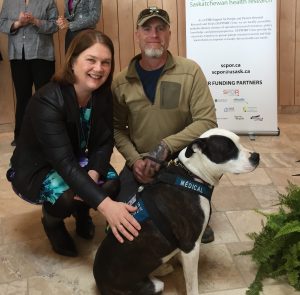Regional Demonstration Project:
The Impact of Service Dogs in the Lives of Veterans Who Problematically Use Opioids (AUDEAMUS)
CRISM Prairies Co-PI, Dr. Colleen Anne Dell, alongside Dr. Nathaniel Osgood and other team members from the universities of Saskatchewan, Regina and McMaster are studying the benefit of service dogs in the lives of veterans who problematically use opioids. It is established within the military community that veterans diagnosed with post-traumatic stress disorder (PTSD) are at high risk for opioid misuse and co-occurring substance use disorders. This is due in part to high rates of prescribed medication, high-risk use of opioids and complex mental health challenges.
The goal of this study is to learn from veterans living with PTSD and paired with an AUDEAMUS Inc. service dog about how the dog assists them with addressing their problematic use of substances, and specifically opiates. AUDEAMUS is a bilingual, injured veteran-run, not for profit organization dedicated to the principle and practice of providing highly skilled and certified service dogs to persons traumatized in the line of duty and whose quality of life depends on it.
There is a near non-existent empirical evidence-base in this area. The potential for this study will make a contribution to both the literature and lives of veterans is significant. This study will examine the impact of both the therapeutic intervention tasks the service dogs are trained in (e.g., tactile stimulation to disrupt emotional overload) and the human-animal bond (bio-psycho-social-spiritual connection) to address veterans’ PTSD and its relation to their mental health and wellness, and specifically problematic substance use focused on opioids. It will also examine AUDEAMUS program outcomes. The research question is: Does an AUDEAMUS service dog assist veterans with PTSD in addressing their problematic substance use, and specifically opiates? And if so, how, accounting for both the tasks the dogs perform and their connection with the veteran?
Physiologic measures will be collected via wearable technology (i.e., Fitbit device & mobile app [with canine iBeacon]). Psycho-social-spiritual measures will be collected via a mobile app, standardized questionnaires (measurement tools), and semi-structured, open-ended qualitative interviews. The data will be collected over a 6 month period. A quasi-control group of veterans with companion animals will be identified. AUDEAMUS veterans already paired with a service dog are important members of our community-based project team, alongside knowledge users and trainees and all have been involved in study design and will be through to data collection and analysis.
Project Publications
- Chalmers D, Dell CA. (2015). Applying One Health to the Study of Animal-Assisted Interventions. Ecohealth. 12(4):560-2.
- Husband, A., Ahmed, A., & Dell, C (2019). An exploratory case study of the impact of psychiatric service dogs on problematic substance use among PTSD-diagnosed veterans. Journal of Substance Use. 25(2);113-117.
- Gibson, M, Williamson, L., Dell, C., Chalmers, D., DeGroot, P. (2021). Perceptions and use of alcohol and medical cannabis among Canadian military veterans living with PTSD. Journal of Veterans Studies. 7(1);59-70.
- Williamson, L., Dell, C., Osgood, N., Chalmers, D., Lohnes, C., Carleton, N., Asmundson, G. (2021). Examining Changes in Posttraumatic Stress Disorder Symptoms and Substance Use among a Sample of Canadian Veterans Working with Service Dogs: An Exploratory Patient-oriented Longitudinal study. Journal of Veterans Studies. 9(11). pp. 1-13.
- Williamson, L., Dell, C., Chalmers, D., Cruz, M., De Groot, P. (2021). Strengthening zooeyia understanding the human-animal bond between veterans living with comorbid substance use and PTSD and their service dogs. Human Animal Interaction Bulletin. 10(2);20-47.
To learn more about Dr. Dell’s research program and Animal Assisted Interventions, please visit her website.
To learn more about AUDEAMUS Inc. or to get involved with their program, please visit their website.




